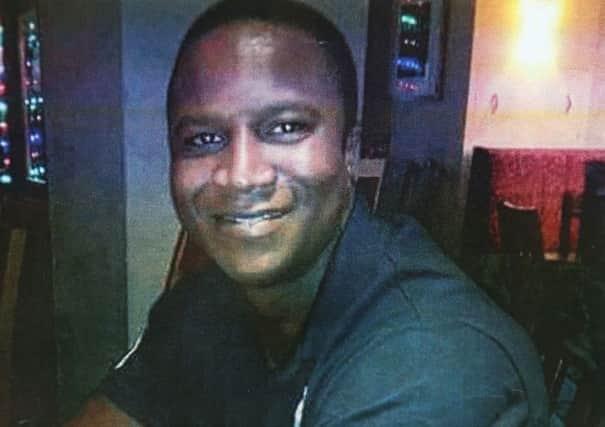New evidence uncovered in Sheku Bayoh custody death case


Father-of-three Sheku Bayoh suffered a catalogue of injuries before losing consciousness when he was restrained by six officers in Kirkcaldy in 2015.
Police reports at the time suggested Mr Bayoh, 31, had become aggressive and “stamped” on a female officer responding to calls of a man carrying a knife in the Templehall area of the town.
Advertisement
Hide AdAdvertisement
Hide AdBut newly-uncovered CCTV footage suggests police may have “escalated rather than diffused” the situation and suggests racism may have played a part in the treatment of Mr Bayoh.
The evidence was boadcast as part of the BBC Scotland documentary ‘Disclosure: Dead in Police Custody’ on Monday evening.
It comes two months after Mr Bayoh’s family, which has campaigned to find out how he died, say were told by the Lord Advocate there was not enough evidence to prosecute any police officers, although the case remains open.
Mr Bayoh - who was born in Sierra Leone, but moved to Scotland at the age of 17 - suffered 23 separate injuries including a cracked rib, head wounds consistent with baton strikes, and burst blood vessels in the eyes - a possible sign of suffocation.
On the day he died, Mr Bayoh had been at a friend’s house in the morning watching a boxing match and had taken the drugs MDMA and the psychostimulant ‘Flakka’.
He is said to have become aggressive with a friend after ingesting the substances, before returning home and picking up a knife from his kitchen. Concerned neighbours contacted the police, but Mr Bayoh had discarded the knife before they arrived.
Cause of death was noted as “sudden death in a man intoxicated…[drugs] whilst under restraint.”
However, documents reveal that before Mr Bayoh’s alleged stamping attack on the officer, three officers discharged their irritant spray into his face and a fourth drew her baton at him.
Advertisement
Hide AdAdvertisement
Hide AdOfficial police documents stated Mr Bayoh was pinned to the ground for “a maximum of 30 seconds” and the restraint had been, “appropriate, text book stuff, in line with police training.”
But a civilian witness told the documentary team officers were lying across Mr Bayoh for several minutes, adding: “I heard him screaming. It sent chills through me. I heard the man shout to get the police off him. They never moved.”
The BBC also saw evidence suggesting that Mr Bayoh’s actions may have been distorted or exaggerated by police.
An internal police document written less than an hour after Bayoh’s death said that police attended reports of a male with a “machete” in the street, and that the “male strikes one with machete”.
None of the officers saw Mr Bayoh with a knife or machete, nor has there ever been any suggestion he struck one of them with a blade.
Mr Bayoh’s family are likely to ask for the decision to deny the prosecution of officers to be reviewed but are now calling for a full public inquiry.
His sister, Kadi Johnson, said: “We are still here suffering, his boys are suffering.”
“There was no need for Sheku to have died that day. We just want to know how our brother died, that’s all.”
Police Scotland told the BBC they could not comment while the case was ongoing.